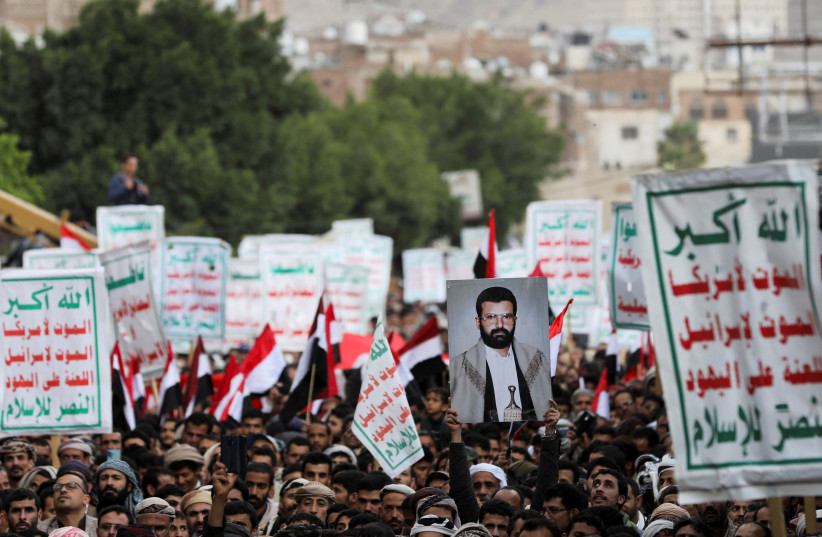Iran-backed Houthi gunmen kidnapped 17 Baha’is in Yemen
The Islamic Republic of Iran proxy movement, the Houthis, on Thursday violently stormed a peaceful gathering of the persecuted religious minority community, Yemeni Baha’is, in the war-ravaged Arab county.
The raid resulted in the Houthis “disappearing at least 17 people, including five women, “according to a statement from the Baha’i International Community (BIC), which urged the immediate release of those detained.
“Across the Arab region we see governments striving to work toward peace, to set aside outdated social differences, promote peaceful coexistence, and to look to the future,” said Bani Dugal, the BIC’s Principal Representative to the United Nations. “But in Sana’a the de facto Houthi authorities are headed in the opposite direction, doubling down on the persecution of religious minorities, and staging brazen armed raids against peaceful and unarmed civilians. The Houthis have violated the human rights of Baha’is and many others, time and again, and it must stop.”
Video footage from Baha’is showed the attack as they gathered via Zoom call.
The Houthis continue to further Iranian interests
Despite outrage over US President Biden’s delisting of the Houthis as a foreign terrorist movement in 2021, the Houthi movement has continued to destabilize Yemen and advance the goals of its military arms supporter, the Islamic Republic of Iran. The Houthi slogan remains: “God is great, death to the US, death to Israel, curse the Jews, and victory for Islam.”
 Houthi supporters rally to mark the 8th anniversary of the Saudi-led military intervention in Yemen’s conflict, in Sanaa, Yemen March 26, 2023. (credit: REUTERS/KHALED ABDULLAH)
Houthi supporters rally to mark the 8th anniversary of the Saudi-led military intervention in Yemen’s conflict, in Sanaa, Yemen March 26, 2023. (credit: REUTERS/KHALED ABDULLAH)“Even while talks are underway to end the war in Yemen, we see the Houthi authorities continuing to engage in violent acts of persecution against their own people,” said Dugal. She added, “The international community must now use its leverage to compel the Houthis to respect the human rights of all Yemeni citizens, starting with the release of these 17 or more innocent Baha’is arrested in this violent, unjustifiable raid. Yemeni Baha’is want to serve their country, to help it overcome its current challenges, and work towards advancing its peace and prosperity. How tragic that, at this propitious moment, the Houthi authorities choose to act in this shameful way.”
There are an estimated 2,000 Baha’i community members who live in Sanaa. The Houthis captured Sana’a from Yemen’s government in 2014 and the country has been gripped by a brutal civil war for nearly a decade.
Sheina Vojoudi, an Iranian dissident who fled the Islamic Republic and is an associate fellow for the Gold Institute for International Strategy, told The Jerusalem Post that “Religious tolerance in the countries under Islamic rules is just twisting the truth, especially in the countries with the influence of the Islamic Republic in Iran. Obviously, the Islamic Republic supports and funds the Houthis and the Islamic Republic is the Baha’is’ number one enemy because the Islamic regime believes that Baha’i faith isn’t actually a religious faith but it’s a political movement led by Israel. That’s why especially in Iran Baha’is are persecuted and under control and pressure.”
Baha’is are persecuted and often arrested
Iran’s regime has committed a slow-moving genocide against the Baha’is in Iran, according to some human rights experts. The mullah regime does not recognize the Baha’i religion and frequently arrests and executes Baha’is. The Iranian theocratic state discriminates against the Baha’is in many walks of life, according to UN human rights reports.
The Post has reported on the role of the Iranian regime’s former ambassador to the UN, Mohammad Jafar Mahallati, who helped lay the ideological foundation to wipe out the Baha’is during his tenure for the clerical’s regime foreign ministry. Mahallati currently teaches at Oberlin College in Ohio.
The Baha’i religion was founded in 1844 in Iran and espouses a doctrine of “universal peace.” The headquarters of the Baha’i faith is in Haifa. The young religion does not have clergy and, according to BIC, “annually form councils to minister to the spiritual and material needs of their communities.” The Baha’i community is estimated to have five to eight million worshippers across the globe.




Comments are closed.